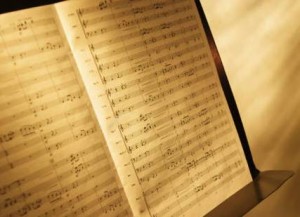 Normally I attend a parish that has excellent music—the best in town, actually. However, last Christmas Eve I ended up at a Mass that included a strange musical prelude. There were great voices in the choir, but the instruments employed (drums and an electric guitar) were out of place. The pounding and grinding were like dirt in an operating room, rocks in a salad, or a slap in the face at a hotel’s front desk.
Normally I attend a parish that has excellent music—the best in town, actually. However, last Christmas Eve I ended up at a Mass that included a strange musical prelude. There were great voices in the choir, but the instruments employed (drums and an electric guitar) were out of place. The pounding and grinding were like dirt in an operating room, rocks in a salad, or a slap in the face at a hotel’s front desk.
Perhaps the incongruence was clearest when “God Rest Ye Merry Gentlemen” was performed. A nice song from nice voices, yet those voices were beaten down and drowned out by the drums and guitar: Imagine (or ear-magine) an undercurrent of guitar-grinding throughout these words, punctuated every so often by aggressive hits of a drum: “God rest ye merry gentlemen, let nothing ye dismay. Boom! Boom! Remember, Christ our savior was born on Christmas day. Boom! Boom!…” I couldn’t help but wonder, “Just how are those merry gentlemen supposed to get any rest amidst all that noise?”
Kidding aside, I really did wonder if I was the only one who was dismayed by all the noise. I wouldn’t be able to tell at the Mass itself, since I couldn’t reasonably expect people to start tossing tomatoes at the choir. However, three main questions arose: 1.) Does anyone here know the Church’s teachings on sacred music? 2.) Does anyone here understand the Church’s teachings on sacred music? 3.) Does anyone here pray?
As for the first question, the Church’s teaching is plain enough for anyone who wants to look it up. If reading Papal Legislation on Sacred Music would takes too much time, there’s the short cut of reading chapter VI of Sacrosanctum Concilium, the Second Vatican Council’s Constitution on the Sacred Liturgy. (A preparatory hint: Drums and electric guitars are not endorsed, while Gregorian chant and pipe organs are.)
As for the second question, I don’t intend to impose a false standard, such as giving a detailed historical and theological analysis of why the Church teaches what she does on sacred music. I can’t do that myself. What I wonder, though, is whether people know that the Church’s musical teachings are not arbitrary, but directed to a very specific purpose: the glory of God and the salvation of man.
As the Church lets us know which books make up the Bible and which Sacraments we are to avail ourselves to, so she tells us which music is appropriate for liturgical celebrations. The singing at Mass should inspire the congregation to pray. In fact, the singing itself should be a prayer.
We’re now at the third question, which concerns a topic unsurpassed in importance when it comes to salvation. It is through prayer that we obtain the graces necessary to overcome any obstacles that would get in the way of doing God’s will. So powerful is prayer that St. Charles Borromeo referred to it as “the beginning, the growth, and the completion of all virtue.” St. Alphonsus Liguori said prayer was “an indispensable and certain means to obtain eternal happiness.”
Yet how many people make use of this great means of prayer during entertaining liturgies? I’d guess very few, not because of a lack of will, but because it’s almost impossible to pray when the grinding of guitars prevails. Even if someone had the intention to pray, he would be prevented from doing so by the noise around him.
Entertaining liturgies do little to advance the cause of our salvation, mainly because they prevent us from praying. Recollected liturgies, on the other hand, do a tremendous amount of good for our salvation, because they provide a noble and prayerful atmosphere for the faithful. Remember that Jesus spoke in Matthew 21 of the temple as a house of prayer, not a house of entertainment.
With that in mind, I want to encourage everyone to heed the Church’s changeless chant challenge. If your parish is not doing this already, two ways that might help make it happen are sending this essay to the music director, or by giving sacred music CDs to that director. Paraclete Press has plenty of outstanding music, such as these beautiful Palestrina renditions from Gloria Dei Cantores and this collection of popular chants from the Monastic Choir of St. Peter’s Abbey in Solesmes, France.
The recorded music and the teaching of the Church are both readily available. The only thing lacking in many parishes is the will to put these treasures to use. This is the challenge: If you really desire to glorify God and save your soul, why not manifest that desire by helping to implement the music meant for this purpose?
I’ve started to do my part at the parish mentioned in the opening, and will continue to encourage recollected liturgies there. If I end up at that church next Christmas Eve, I hope their musical aspirations will have soared above and beyond what they were last year. If so, the merry gentlemen can get some rest, and the congregation can get some praying done.
May it be so, for the glory of God and the salvation of souls!



